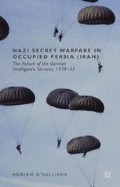Abstract
Germany secured ‘uncontested supremacy’ in Persia in four areas: in communications, in industrial investment (in tandem with Reza Shah’s policy of industrial expansion), in trade (between 1933 and 1941 German–Persian trade increased almost ninefold), and in cultural and political penetration.3 The final stage of the ‘master plan’ — the absorption of Persia into Germany’s military sphere — was of course pre-empted by the Allied invasion of the country in August 1941. Any suggestion that the Anglo-Soviet operation was an avoidable, egregious violation of a neutral state fails to take into account the fact that the Germans were poised to complete this fourth stage of their plan when the Allies carried out a pre-emptive strike: they invaded Persia and expelled the German expatriate colony. London and Moscow really had no choice. The German presence in Persia, astride the lines of communication between the British Middle East and British India, and immediately to the rear of the Red Army in Transcaucasia, was politically provocative and strategically unacceptable: invasion was inevitable.
Dismiss from your mind any idea of a generous policy towards the Germans to please the Persians or anyone else. (Winston Churchill)1
Our object should be to make the Persians keep each other quiet while we get on with the war. (Winston Churchill)2
Access this chapter
Tax calculation will be finalised at checkout
Purchases are for personal use only
Preview
Unable to display preview. Download preview PDF.
Notes
See ‘The Morale of the Troops’ in Ralf Blank et al., German Wartime Society 1939–1945: Politicization, Disintegration, and the Struggle for Survival, trans. Derry Cook-Radmore et al., Germany and the Second World War 9.1, edited by the Militärgeschichtliches Forschungsamt (Research Institute for Military History), Potsdam, Germany (Oxford: Clarendon Press, 2008) (MGFA 9.1), 51.
Reader Bullard, ‘Persia in the Two World Wars,’ Journal of the Royal Central Asian Society 50, no. 1 (1963): 12–13. © The Royal Society for Asian Affairs, reprinted by permission of the publisher (Taylor & Francis Ltd, http://www.tandf.co.uk/journals) on behalf of The Royal Society for Asian Affairs.
See John Harvey, ed., The War Diaries of Oliver Harvey, 1941–45 (London: Collins, 1978), also mentioned in Kitchen, British Policy, 93.
Winston S. Churchill, The Grand Alliance, vol. 3 of The Second World War (Boston, MA: Houghton Mifflin, 1974), 377. Copyright 1950 by Houghton Mifflin Company, renewed 1977 by Lady Spencer-Churchill, The Honourable Lady Sarah Audley, and the Honourable Lady Soames. Reprinted by permission of Houghton Mifflin Harcourt Publishing Company. All rights reserved. Also reproduced with permission of Curtis Brown, London on behalf of the Estate of Sir Winston Churchill. Copyright © Winston S. Churchill.
Perhaps the clearest exposition of the facts of the case has been provided by Clarmont Skrine in World War, 79–81. An interesting insight (behind the scenes, as it were) into the weighty decisionmaking at the highest levels that preceded the invasion is provided by Gabriel Gorodetsky, Stafford Cripps’ Mission to Moscow, 1940–42 (Cambridge: Cambridge University Press, 1984), 209–15. For an explanation of the Soviet view of the need to invade and occupy Persia, see Rezun, ‘German Threat,’ 379–83.
The literature on Operation COUNTENANCE is not abundant. In addition to the official histories — Dharm Pal, Campaign in Western Asia (Calcutta: Combined Inter-Services Historical Section, India and Pakistan, 1957)
and UK Central Office of Information, Paiforce: The Official Story of the Persia and Iraq Command 1941–1946. (London: HMSO, 1948) — I would recommend two highly readable books:
Compton Mackenzie, Eastern Epic (London: Chatto & Windus, 1951) and Bill Slim’s Unofficial History. Churchill’s unique synopsis is to be found in Grand Alliance, 377–84. For a remarkably unbiased Persian narrative,
see Faramarz S. Fatemi, The U.S.S.R. in Iran: The Background History of Russian and Anglo-American Conflict in Iran, Its Effects on Iranian Nationalism, and the Fall of the Shah (New York: Barnes, 1980), 13–42;
another balanced Persian view, based on the British records, is to be found in F. Eshraghi, ‘Anglo-Soviet Occupation of Iran in August 1941,’ Middle Eastern Studies 20, no. 1 (January 1984): 27–52, and ‘The Immediate Aftermath of Anglo-Soviet Occupation of Iran in August 1941,’ Middle Eastern Studies 20, no. 3 (July 1984): 324–51. A concise operational overview may be found in Archibald P. Wavell, ‘Despatch on Operations in Iraq, East Syria and Iran from 10th April, 1941 to 12th January, 1942,’ Supplement to The London Gazette, no. 37685 (13 August 1946), 4098–101.
Ibid.; see also Marshall L. Miller, ‘How the Soviets Invaded Iran,’ Armed Forces Journal 124, no. 7 (February 1987): 30–4.
See Harold E. Raugh, Wavell in the Middle East, 1939–1941: A Study in Generalship (London: Brassey’s, 1993), 250.
16. See among others Klaus Jaschinski, ‘Das deutsch-iranische Verhältnis im Lichte der allierten Invasion in Iran 1941,’ Comparativ: Zeitschrift für Globalgeschichte und vergleichende Gesellschaftsforschung, no. 1 (2004): 170. For a survey of the state of the Persian armed forces and for a general account of the invasion and occupation from a Persian perspective, see Kaveh Farrokh, Iran at War, 1500–1988 (Oxford: Osprey, 2011), 264–82.
Copyright information
© 2014 Adrian O’Sullivan
About this chapter
Cite this chapter
O’Sullivan, A. (2014). Invaders and Occupiers. In: Nazi Secret Warfare in Occupied Persia (Iran). Palgrave Macmillan, London. https://doi.org/10.1057/9781137427915_3
Download citation
DOI: https://doi.org/10.1057/9781137427915_3
Publisher Name: Palgrave Macmillan, London
Print ISBN: 978-1-349-49127-8
Online ISBN: 978-1-137-42791-5
eBook Packages: Palgrave History CollectionHistory (R0)

